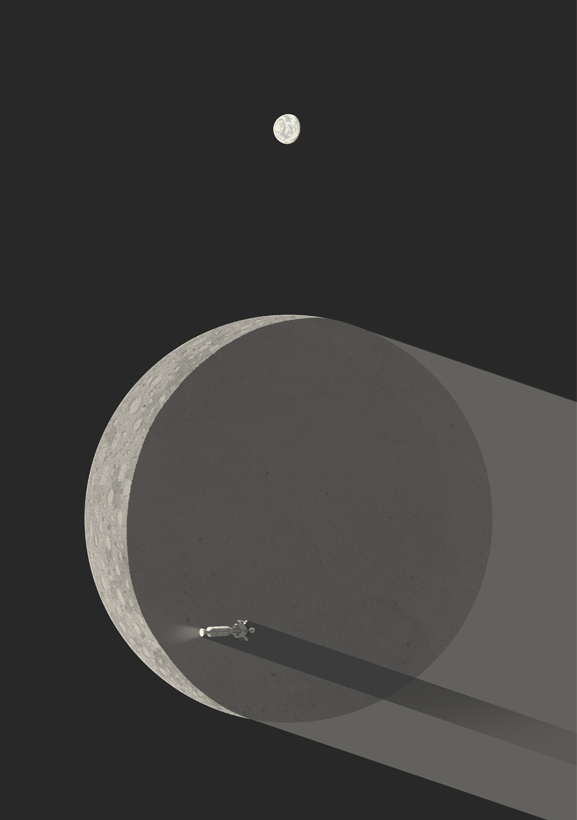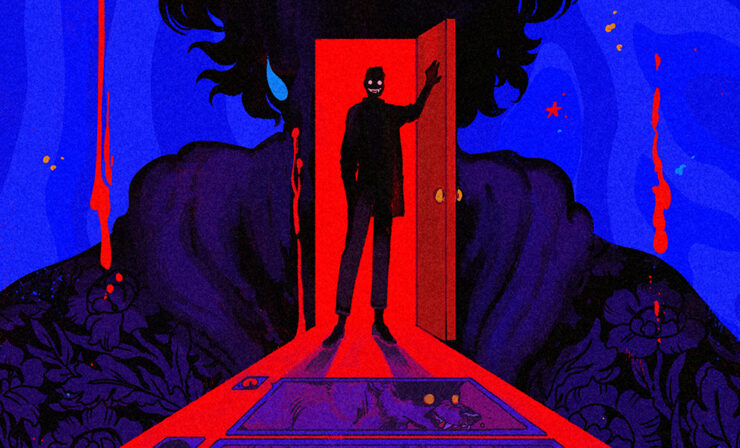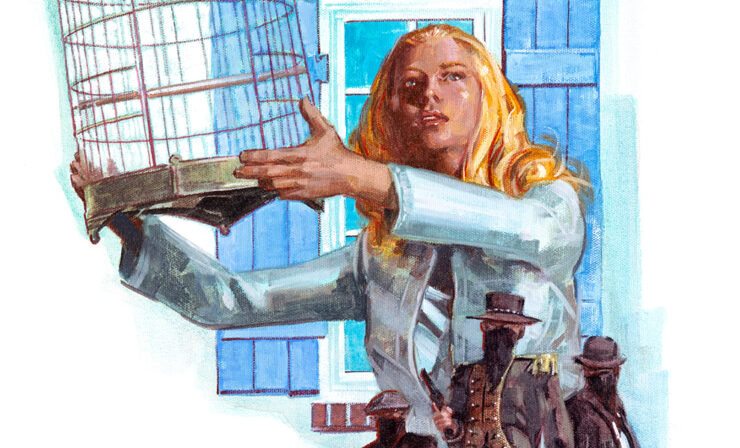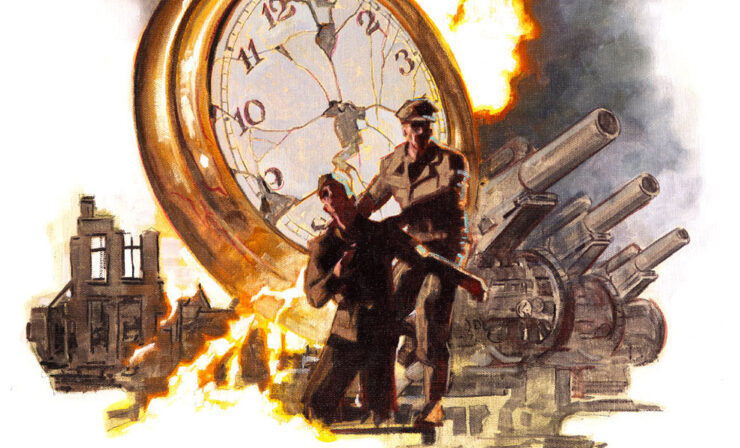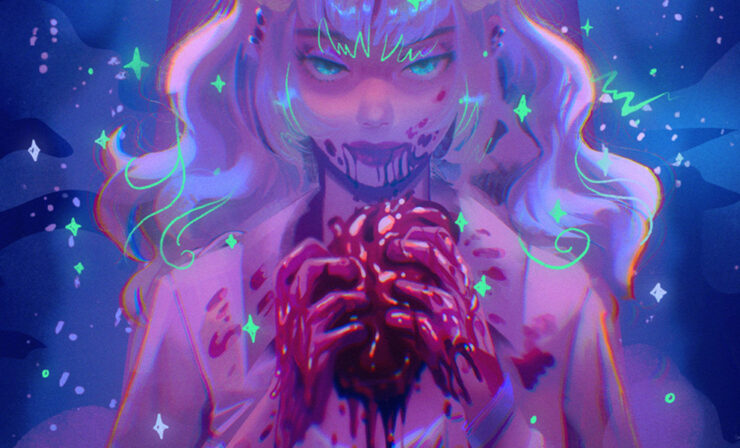Toby Benson has a chance to make history. The first mind to circle the moon without a body in tow. It’s a golden opportunity, perhaps the only chance for a 19-year-old whose body failed him to become immortal. But as he reaches the dark side of the moon and loses signal from Earth, the cold of space threatens to overwhelm him.
When the doors drifted open like wings, when I trained my cameras to the star-flecked blackness, when the metal arms released me from their embrace: that was the moment my first dream came true.
I checked it off the list.
“You’re clear of the shuttle, Toby. Begin translunar injection.”
Mission control’s voice sounded in my ear, but I had no ear. I had adapted to that change early on.
“Roger that, Houston.” I’d always wanted to say that. I’d learned how to turn my thoughts into a stream of text, the only form of speech I had. “Activating ignition for translunar injection.”
The engines roared, but you can’t feel vibrations without bones. You can’t yield to acceleration without flesh.
“Thirty seconds left on the burn, Houston.”
“Trajectory change is looking good from here.”
I switched off the engines with a thought command. “Delta-v is on target, Houston. I’m on my way to the moon.”
A burst of applause, then: “Safe travels, Toby. Let’s make history together!”
After that I coasted in silence for several hours. My cylindrical housing turned slowly, like a rotisserie, so it wouldn’t overheat. The Earth rose in my visual field, filling it with her iconic, marbled glory—half in jeweled light, half in deepest shadow.
Checked off another one.
The sensation of cold built during the quiet, darker intervals. I shouldn’t have felt anything so corporeal. I hadn’t for years, not since the phantom pains of lost limbs and absent organs. They’d wired me for sight and hearing. I didn’t miss the rest.
When your dreams are fueled by words and pictures, when your body has you trapped in one position and you want so badly to do great things: that’s when you memorize all those famous lines. You act out the scenes in your head, and you’re always the hero.
Heroes aren’t bothered by the cold. They don’t complain. My mother never did. She would come home at night and rub bag balm onto her hands. Chapped skin would curl away, powder white against coffee black, especially after she’d pulled a double dishwashing shift.
On one of those nights, years ago, I asked her, “Does it hurt?”
“Like the devil on Sunday, baby, but it’s only pain. Buckle down and push through. Get the job done.”
She told me that a lot, those first few months after the transfer. My old body was worthless, but my brain was good. The engineers tossed around words I looked up later. Plasticity, neurogenesis, connectomics. Bottom line: the dying, wheelchair-bound sixteen-year-old could make history in the space program. Sign me up!
But the change was hard, often painful. My new home lacked the usual body parts. I was as frustrated as ever, though I was alive.
“You’re lucky to be here, son,” Mama scolded. “Getting a second chance like this. I don’t want to hear you fussing.”
Pain was my worst friend even before the transfer. You think you’d get used to it after a while—that failing nerves would mean numbness—but bodies don’t work that way. They take time to die. They make you pay while you wait.
Sometimes Mama couldn’t afford the co-pay for my drugs. Sometimes I went days without pain medication while we waited for the pharmacy to reach the doctor, because the government thought Mama might be dealing drugs. As if she had time for that.
I tried to ignore the phantom chill of space. I could handle the discomfort—I’d been through worse in my old body—but the sensation disturbed me. I slept, my only escape.
“Toby, this is Houston with a signal check.”
I woke.
“I hear you loud and clear, Houston.”
“We’ve uploaded the latest numbers for your lunar orbit insertion. Engine readouts look good. How are things at your end?”
Text can’t betray chattering teeth. Not that I had any, but that’s how cold I felt. I wanted my mother’s warm bulk against me. We’d shared a bed long past the age when kids and parents typically stop, but needing someone to roll you over at night isn’t typical.
“Houston, I’d like to talk to my mother.”
Is it wrong for a nineteen-year-old man—if you could still call me a man—to ask for his mama?
“We can patch her in.”
After a few minutes, she spoke. “I’m here. What’s the matter, baby?”
“I’m really cold. Freezing. It’s hard to think.”
The seconds stretched like tiny eternities. Do we ever lose the fear of disappointing our mothers?
“Toby, this is Doctor Keil. Does the sensation decrease with auditory input?”
“Some.”
“What about visual?”
“Maybe? There isn’t much to see at the moment.”
“I suspect it’s an artifact of sensory deprivation.”
My mother and I had looked up those words long ago. The past two years had been free of phantoms. I’d been able to train with NASA in comfort. Why would they come back now?
Nobody likes surprises in space travel.
“How about I read to you?” Mama suggested. “All those books you tried to share with me… I never had the time before, but I do now.”
“Sure. Let’s try that.”
With my mother’s voice in my ears, I captained a vast starship. I battled dragons; teleported across the galaxy; invoked strange and powerful spells. I had superhuman strength and extrasensory perception.
Mama read aloud from books whose spines had been white with use when I’d bought them. That she hadn’t sold them came as a surprise. She kept on until her voice got scratchy, and then Fred Shu over at mission control took a shift, and then others. Mama’s voice kept the cold at bay better than anyone else’s.
“Folks, I hate to interrupt, but we have ten minutes to the loss of signal point. We need Toby to run a systems check.”
Was I that close to the moon already? Indeed, her alabaster curve swept into my peripheral vision.
“All readouts are green, Houston.”
“What about you, Toby? How are you doing?”
“I’m scared.”
The thought slipped to text by accident. It happens sometimes when I’m not careful.
A long pause before the reply came: “We don’t have any good ideas here, I’m sorry to say. You’ll have ten minutes of radio silence before the burn, and then another twenty after. Can you handle it?”
I muted the transmitter to keep my thoughts safe.
“Toby, if it’s too painful to execute the lunar orbit insertion, stay passive and let the moon’s gravity shoot you back. That’s why we chose this trajectory. It’s better than a misfire. Do you copy?”
Unmute. “Copy that, Houston.”
What they didn’t say: give up on circumnavigating the moon. Fail to prove that humanity doesn’t need bodies to crew its spacecraft; that we don’t have to wait for artificial intelligences; that kids like me can go where few able-bodied adults have been… and beyond.
If I couldn’t survive the dark silence, the loneliness, I would set the test program back by years. The Apollo missions had crews. The astronauts kept company, cracked wise, backed each other up. My kind would be alone in the dark. The world was watching, waiting. If I gave up, what were the odds they’d give us a second chance?
“You can do it, baby. It’s only thirty minutes of quiet, and Mama’s going to be right here when you come back.”
She spoke as if I were a child. I hated that, normally. Now? I wanted to cry.
But you can’t make tears without ducts and glands. You can’t sob without lungs.
I transmitted: “I’ll do my best.”
“One minute to LOS.”
The moon loomed, familiar and white, filling most of my view as I rotated toward it: my cratered dream; my harsh mistress. The blanched horizon terrified me.
“Baby, you do what you need to and come back safe. You’ve made enough history.”
“Five seconds to LOS.”
The last thing I heard was Mama’s voice: “I love you, baby, no matter what.”
Silence deafens. Cold burns.
How do we make sense of such oxymorons? Insanity, that’s how. If someone offers you a chance to cheat death, the sane response is to accept it, right?
Maybe not.
My mind had played all kinds of tricks on me, but the cold of space was the cruelest. Chill seeped into bones I didn’t have. Non-existent fingers and toes ached, like they had on winter nights without gas. I shivered without muscles.
Ten minutes to decide: be a hero, or go to sleep? Jim Lovell, Sally Ride, Guy Bluford. What would Toby Benson mean to history?
I could use my “free return” to Earth. I could sleep and let gravity do its work. I could see the headlines: Toby Benson, Man-Machine Hybrid, Fails to Replicate Apollo 8 Mission.
Better to use my imagination—my strongest remaining asset. I was Amundsen at the South Pole; Shackleton trapped by ice. I had to persist or doom my crew to death.
No second chances. No excuses. No sleep.
The Sandman had often carried me away when I was a child. In his dreaming embrace, I’d found solace. Sleep would swaddle me like a cozy blanket. I never wanted to leave it, especially on school mornings.
“I’m still tired, Mama,” I would protest.
“Get up, Toby! I’m working twelve-hour shifts, and you’re telling me tired? I don’t think so.”
During winter, ice coated the half-dozen steps from our tenement door to the sidewalk.
“Clumsy,” Mama chided the first time I slipped. “Watch yourself! I can’t be paying for broken bones.”
Each year I fell more often. Fell down. Fell off. Fell asleep. My sixth-grade teacher convinced Mama to take me to a doctor. A year passed before we got a diagnosis, but I looked up a lot of words in those twelve months: ataxia, dysarthria, cardiomyopathy, transsynaptic atrophy.
I did all the reading. Mama heard the executive summary: my nerves were failing. My muscles weren’t working right, and they were going to get worse until they stopped.
The heart is a muscle. Mama hadn’t known that.
Once upon a time, I was Toby, age fourteen, living in Chicago. I lay on the sidewalk, unable to move. For hours I watched snowflakes drift from the night sky, clouds obscuring the stars, the tiny crystals taking their places.
People walked right past me. I knew what they were thinking: another loser kid, high on drugs, not worth helping. If our landlady hadn’t recognized me on her way home… well, you know how those stories end.
An orange light flashed: one minute before I had to start the burn. If I stayed passive, the moon would slingshot me back to the Earth. If the cold distracted me while I worked the engines, I could drift for eternity or crash into the lunar surface.
I was alone again, this time on the quiet side of the moon. No one would help. No one would see.
Frost buzzed through me like a swarm of bees, stinging my body in a million places. You can’t breathe through pain if you have no lungs. You can’t run warm-up laps without legs. You can’t huddle up when you’re all alone.
But I wasn’t helpless. I was a rocket. I had engines. My new body thrummed with latent power.
Time to write a new story.
When the countdown reached zero, I sent the thought to activate ignition. I applied the right amount of energy, the exact direction of thrust. I gritted my imaginary teeth and triple-checked the readouts as my velocity changed. Then I turned off the engines.
The moon’s gravity held me in stable orbit for as long as I desired. Craters dusted in abalone whites and grays filled my view in one direction. I watched the familiar contours pass by—Secchi, Mount Marilyn, the Sea of Tranquility—their names etched in my memory better than my own face. On my other side, the stars sang their vast, maddening, frigid aria, but I was safe in a lunar embrace. Safe enough to let myself sleep.
Blissful oblivion took me for the next twenty minutes.
When the sun’s light warmed me again; when a cacophony of cheers filled my hearing; when my planet rose like a robin’s egg from a shadowed nest: then, I checked off one more item.
Text copyright © 2018 by SB Divya
Art copyright © 2018 by Jun Cen
Buy the Book


Loss of Signal










